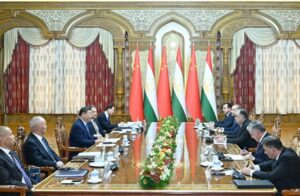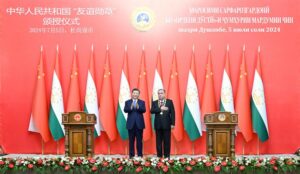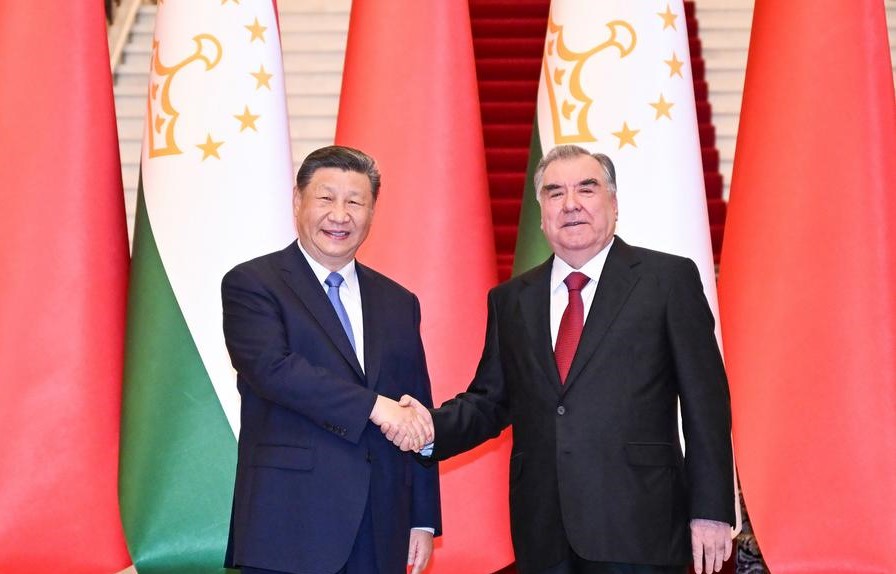DUSHANBE: China and Tajikistan on Friday elevated their ties to a comprehensive strategic cooperative partnership in the new era during Chinese President Xi Jinping’s third state visit to the Central Asian country.
The decision was announced during Xi’s talks with his Tajik counterpart Emomali Rahmon, who described China and Tajikistan as friendly neighbors and loyal friends.
The past 32 years since the establishment of diplomatic ties between the two countries have seen fruitful cooperation. China and Tajikistan have also set an exemplary model of international relations between nations and are aiming for even more cooperation in various fields.

GROWING TIES FOR SHARED DEVELOPMENT
The decision to elevate ties was based on the current development needs of bilateral ties, the two countries said in a joint statement after the presidents’ talks.
China and Tajikistan, connected by mountains and rivers, share a common destiny, Xi wrote in a signed article published in Tajik media on Friday, noting that over the past three decades and more, China-Tajikistan relations have stood the test of the volatile international situations and maintained the momentum of sound and steady development.
Based on the high level of cooperation between the two countries and their common aspiration to deepen bilateral relations, the two sides are committed to building a China-Tajikistan community with a shared future featuring everlasting friendship, solidarity and mutual benefit, according to the joint statement.
Noting that China will remain steadfast in promoting friendship and mutually beneficial cooperation with Tajikistan, Xi said during the talks that China will firmly support Tajikistan in following a development path that suits its national conditions, firmly support the efforts of Tajikistan to safeguard its independence, sovereignty and territorial integrity, and firmly support the various political arrangements and development measures in Tajikistan put forth by President Rahmon.
China firmly opposes interference in Tajikistan’s internal affairs under any excuse by any external force. No matter how the international landscape changes, China will always be a trustworthy friend, a reliable partner and a close brother of Tajikistan, he said.
In an act to show the Chinese people’s friendly feelings towards President Rahmon and the people of Tajikistan, Xi on Friday awarded the “Friendship Medal,” China’s highest state honor for foreigners, to Rahmon. Friday’s ceremony marks the first time this prestigious award has been presented outside of China.
As he presented the medal to Rahmon, Xi said: “I am ready to work with President Rahmon to uphold good-neighborliness and friendship, pursue mutual benefit and win-win outcomes, and jointly lead China-Tajikistan relations to new heights, delivering more benefits to both nations and their peoples.”
By fostering closer ties with China, Tajikistan can witness greater social and economic development, said Yusuf Akhmatbekzoda, deputy director of the Directorate for Construction of Government Facilities of the Executive Office of the President of the Republic of Tajikistan.
BOOMING PRACTICAL COOPERATION
China has long been Tajikistan’s largest source of investment and major trading partner, with the two-way trade nearing 4 billion U.S. dollars in 2023.
Ten years ago, China and Tajikistan signed a memorandum to build the Silk Road Economic Belt, making Tajikistan the first country to do so under the Belt and Road Initiative.
A number of China-Tajikistan joint projects have been implemented, including a cement plant in Yavan, an agriculture technology demonstration center in Khatlon, and an agriculture and textile park in Dangara, which have helped upgrade Tajikistan’s industrial technology and created thousands of local jobs.
Premium green produce of Tajikistan such as cherries, lemons and grapes has steadily made its way to Chinese households and is quite popular among Chinese consumers.
China is currently the top investor in Tajikistan’s economy, driving economic growth, creating more job opportunities, and promoting social and infrastructure development in the country, said Qanoatullo Saifulloev, deputy director of Tajikistan’s state-run Khovar News Agency.

During their talks on Friday, Rahmon said Tajikistan is willing to take the implementation of the outcomes of Xi’s visit as an important opportunity to further promote Belt and Road cooperation, deepen cooperation in connectivity, agriculture, critical minerals, new energy and other fields, so as to accelerate the country’s industrialization and modernization.
When the two leaders jointly met the press following their talks, Xi said China is ready to import more quality products from Tajikistan and continuously upgrade the quality and scale of China-Tajikistan economic and trade cooperation.
The two countries have agreed to continue to deepen connectivity cooperation and support Tajikistan in tapping more potential in boosting transit transport, he said.
On Friday, Xi and Rahmon also attended the inauguration of the parliament and government buildings aided by China on the Rudaki Avenue in Dushanbe. Akhmatbekzoda said these “Made by China” buildings are unique, and “will stand as symbols of Tajik-Chinese friendship, benefiting our descendants.”
FLOWERING PEOPLE-TO-PEOPLE EXCHANGES
The Rudaki Avenue is also a witness to China-Tajikistan people-to-people and cultural exchanges.
A Tajik poet living more than a thousand years ago, Rudaki is celebrated in his home country as the founder of classical Persian-Tajik literature and is often referred to as the “Adam of poets.”
In Xi’s signed article, he invoked the words of Rudaki to express his anticipation for meeting with Rahmon. “The famous Tajik poet Rudaki once said that nothing could compare to the joy of a reunion with family or friends. I look forward to my meeting with President Rahmon to jointly open up brighter prospects for China-Tajikistan relations.”
The life stories of Tajikistan’s historical and literary figures, including Rudaki, are widely known in China, Xi wrote in his signed article in Tajik media ahead of his 2019 visit to Tajikistan.
Rudaki’s works have been translated by Chinese translators, one of whom is Xia Ran, a teacher at the Confucius Institute at Tajik National University. Over the past few years, Xia has also collaborated with his wife, a Tajik national, on translating the Analects of Confucius and Tang Dynasty poetry.
The couple found that the process of translation is also a journey into each other’s culture. Tang Dynasty poetry, known for its concise language, rich emotions, and profound meanings, “like Rudaki’s poetry, has a timeless charm that enlightens people,” said Xia.
The Confucius Institute, where Xia works, is a crucial platform for Chinese-Tajik cultural exchanges. Since its establishment in August 2008, it has trained nearly 39,000 Chinese language learners. In recent years, the number of Tajik students attending Confucius Institutes in their home country or studying in China has significantly increased.
In Xi’s article on Friday, he highlighted how cultural exchange programs, including the Confucius Institutes, the Luban Workshop, seminars, and the translation and publication of literature in both languages, “have helped foster greater mutual understanding and strengthened the ties” between China and Tajikistan.
“These initiatives are akin to small streams that will ultimately converge to form a vast ocean of friendship between our two nations,” Xi remarked.
According to the joint statement, Tajikistan is ready to work with China to promote exchanges and mutual learning among global civilizations, and the two sides will carry out cooperation in areas including research on ancient civilizations, restoration of antiquities, and joint archaeology.
“China will continue to expand cooperation with Tajikistan in such areas as culture, education, health and sports. I hope to see more exchanges between our young people and more exchanges at subnational levels. I also hope our people-to-people exchanges will be as frequent as those between relatives,” Xi said in his signed article.


